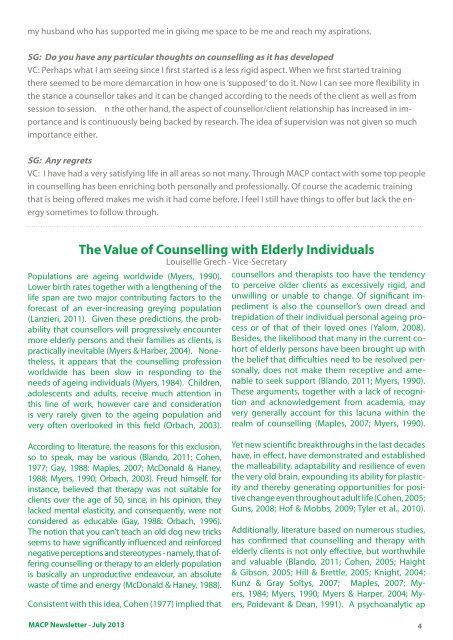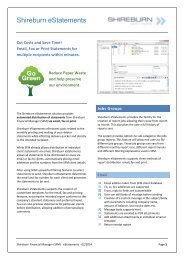MACP Newsletter 2.pdf - Shireburn Software Ltd
MACP Newsletter 2.pdf - Shireburn Software Ltd
MACP Newsletter 2.pdf - Shireburn Software Ltd
Create successful ePaper yourself
Turn your PDF publications into a flip-book with our unique Google optimized e-Paper software.
my husband who has supported me in giving me space to be me and reach my aspirations.<br />
SG: Do you have any particular thoughts on counselling as it has developed<br />
VC: Perhaps what I am seeing since I first started is a less rigid aspect. When we first started training<br />
there seemed to be more demarcation in how one is ‘supposed’ to do it. Now I can see more flexibility in<br />
the stance a counsellor takes and it can be changed according to the needs of the client as well as from<br />
session to session. On the other hand, the aspect of counsellor/client relationship has increased in importance<br />
and is continuously being backed by research. The idea of supervision was not given so much<br />
importance either.<br />
SG: Any regrets<br />
VC: I have had a very satisfying life in all areas so not many. Through <strong>MACP</strong> contact with some top people<br />
in counselling has been enriching both personally and professionally. Of course the academic training<br />
that is being offered makes me wish it had come before. I feel I still have things to offer but lack the energy<br />
sometimes to follow through.<br />
The Value of Counselling with Elderly Individuals<br />
Populations are ageing worldwide (Myers, 1990).<br />
Lower birth rates together with a lengthening of the<br />
life span are two major contributing factors to the<br />
forecast of an ever-increasing greying population<br />
(Lanzieri, 2011). Given these predictions, the probability<br />
that counsellors will progressively encounter<br />
more elderly persons and their families as clients, is<br />
practically inevitable (Myers & Harber, 2004). Nonetheless,<br />
it appears that the counselling profession<br />
worldwide has been slow in responding to the<br />
needs of ageing individuals (Myers, 1984). Children,<br />
adolescents and adults, receive much attention in<br />
this line of work, however care and consideration<br />
is very rarely given to the ageing population and<br />
very often overlooked in this field (Orbach, 2003).<br />
Louisellle Grech - Vice-Secretary<br />
counsellors and therapists too have the tendency<br />
to perceive older clients as excessively rigid, and<br />
unwilling or unable to change. Of significant impediment<br />
is also the counsellor’s own dread and<br />
trepidation of their individual personal ageing process<br />
or of that of their loved ones (Yalom, 2008).<br />
Besides, the likelihood that many in the current cohort<br />
of elderly persons have been brought up with<br />
the belief that difficulties need to be resolved personally,<br />
does not make them receptive and amenable<br />
to seek support (Blando, 2011; Myers, 1990).<br />
These arguments, together with a lack of recognition<br />
and acknowledgement from academia, may<br />
very generally account for this lacuna within the<br />
realm of counselling (Maples, 2007; Myers, 1990).<br />
According to literature, the reasons for this exclusion,<br />
so to speak, may be various (Blando, 2011; Cohen,<br />
1977; Gay, 1988: Maples, 2007; McDonald & Haney,<br />
1988; Myers, 1990; Orbach, 2003). Freud himself, for<br />
instance, believed that therapy was not suitable for<br />
clients over the age of 50, since, in his opinion, they<br />
lacked mental elasticity, and consequently, were not<br />
considered as educable (Gay, 1988: Orbach, 1996).<br />
The notion that you can’t teach an old dog new tricks<br />
seems to have significantly influenced and reinforced<br />
negative perceptions and stereotypes - namely, that offering<br />
counselling or therapy to an elderly population<br />
is basically an unproductive endeavour, an absolute<br />
waste of time and energy (McDonald & Haney, 1988).<br />
Consistent with this idea, Cohen (1977) implied that<br />
<strong>MACP</strong> <strong>Newsletter</strong> - July 2013<br />
Yet new scientific breakthroughs in the last decades<br />
have, in effect, have demonstrated and established<br />
the malleability, adaptability and resilience of even<br />
the very old brain, expounding its ability for plasticity<br />
and thereby generating opportunities for positive<br />
change even throughout adult life (Cohen, 2005;<br />
Guns, 2008; Hof & Mobbs, 2009; Tyler et al., 2010).<br />
Additionally, literature based on numerous studies,<br />
has confirmed that counselling and therapy with<br />
elderly clients is not only effective, but worthwhile<br />
and valuable (Blando, 2011; Cohen, 2005; Haight<br />
& Gibson, 2005; Hill & Brettle, 2005; Knight, 2004;<br />
Kunz & Gray Soltys, 2007; Maples, 2007; Myers,<br />
1984; Myers, 1990; Myers & Harper, 2004; Myers,<br />
Poidevant & Dean, 1991). A psychoanalytic ap<br />
4








